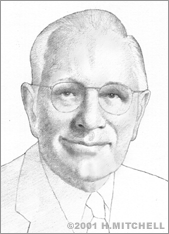Charles Brannock
The Brannock Device is the standard foot measuring tool for the world’s footwear industry. But few people are able to call the device by name, much less identify its inventor, Charles Brannock.
Charles Brannock, born May 16, 1903, carried on the legacy of his father and worked in shoe business. His father, Otis Brannock, joined with Ernest Parks in 1906 to establish the downtown Park-Brannock Shoe Co. in Syracuse, New York. As a Syracuse University student, young Brannock wanted to find the best way to measure the foot. He played around with the idea for a couple of years and finally built a prototype using an Erector set. In 1926 and 1927, Brannock patented the device and created a company to build it.
Before the Brannock device, the available option was a primitive block of measured wood. The Brannock device dramatically improved the accuracy of a foot measurement from 95 to 96 percent accurate. The size system is linear. For example, a men's size 1 is 7-2/3 inches. Each additional size is 1/3 inch longer. Widths work the same way. Each width is separated by a distance of 3/16 of an inch. There are actually nine widths in the U.S. system (width actually varies with foot length): AAA, AA, A, B, C, D, E, EE, and EEE.
The Brannock device comes in green, purple, red, or black. There are models for men, women, athletic shoes and ski boots, and for children, always with two knobs for adjusting the fit cups at both ends for the curve of the heel and a sliding bar for adjusting "firmly for thin foot, lightly for wide foot."

At first, the invention was valued for what it did for the local shoe store. No one else in Syracuse could fit a shoe so perfectly. If someone had an unusual size and the device picked it up, Brannock made sure he had a match in stock. Soon, however, word of the device got around, and demand was suddenly booming. In fact, during World War II, the Army hired Brannock to ensure that boots and shoes fit enlisted men. That’s when Brannock first expanded his manufacturing facilities.
Brannock loved small business, he loved working downtown, and he built his product to last. While some had advised Brannock to make his devices out of plastic, ensuring that they would need to be replaced every couple of years, he refused to entertain that notion and would only make them from durable steel. Today, most shoe stores don't get rid of their Brannock Devices for 10 or 15 years, until the numbers finally wear away from so much use.
Throughout the 1980s, Brannock showed up in the office every working day to take care of business. His health began to fail then, and he considered selling the business, but any would-be buyer had to guarantee the device would not be cheapened or changed. That point was not negotiable.
He died in 1993 at the age of 89. The company was purchased by Sal Leonardi during that decade. Today, the Brannock Device remains the standard for the footwear industry. With more than one million devices sold, the Brannock Device has varied very little over the years.


